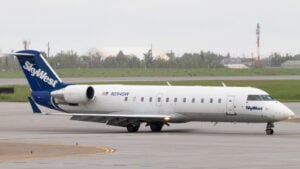SkyWest (SKYW)

SkyWest (NASDAQ:SKYW) is an American regional airline company based in Utah. It operates in a niche market, focusing on small flights towards smaller regional airports, and as one of the largest regional airline companies, it has a pricing advantage over its competitors. SkyWest has contracts with four major U.S. airlines: United (NYSE:UAL), American (NASDAQ:AAL), Alaska (NYSE:ALK), and Delta (NYSE:DAL). This allows SkyWest to provide its flights at a reduced cost compared to its competitors while still being able to provide flight services to smaller airports.
Wall Street investors and institutions also have an optimistic outlook on SkyWest. In the most recent quarter, Norges Bank increased its position in SkyWest by 232,449 shares, making Norges Bank a 0.57% owner of SkyWest.
TD Cowen increased SkyWest’s target price from $85.00 per share to $95.00 per share, indicating a “buy” rating for the company. Evercore also increased its price objective by ten dollars.
Lyft (LYFT)

Lyft (NASDAQ:LYFT) is a U.S. Transportation as a Service (TaaS) giant based in San Francisco, California. The company offers a variety of services within transportation, from rideshare to scooter and bike rentals.
Lyft’s latest financials reveal the positives. According to the company’s first-quarter financials, Lyft outperformed analyst’s revenue estimates by over 10%: Lyft recorded $1.28 billion in revenue when analysts predicted $1.16 billion. Its total rides in Q1 are up by 23% year over year.
On Thursday, Bank of America gave Lyft a double upgrade to a buy rating, citing the company’s newest long-term guidance. According to Lyft’s guidance, it anticipates that growth bookings will increase by 15% annually until 2027. Between 2025 and 2027, Lyft expects over 90% free cash flow conversion. Furthermore, the company anticipates an improved adjusted EBITDA margin at 2.1% this year instead of 1.6% from last year. According to its report, this figure is expected to improve to 4% by 2027.
J.B. Hunt (JBHT)

J.B. Hunt (NASDAQ:JBHT) is a leading American transportation and logistics company headquartered in Lowell, Arkansas. The company provides transportation and logistics services, including truckload (TL), less-than-truckload (LTL), intermodal, and dedicated contract services. J.B. Hunt operates a large fleet of trucks, trailers, and containers, utilizing various modes of transportation to meet customer demands.
As intermodal freight transport continues to expand and replace traditional trucking methods, J.B. Hunt is well-prepared to outperform its competition as it possesses an extensive network and large fleet size. For this reason, even though J.B. Hunt has missed its revenue goals for the first quarter of 2024, this is only a short-term dip, and J.B. Hunt still possesses the long-term potential to be competitive in the transportation market.
Last week, Wells Fargo gave J.B. Hunt an “overweight” rating and a target price of $185.00 per share, a moderate increase from its current closing price of just under $160.00.
On the date of publication, Andy Kim did not have (either directly or indirectly) any positions in the securities mentioned in this article. The opinions expressed in this article are those of the writer, subject to the InvestorPlace.com Publishing Guidelines.
Andy is a self-taught investor who is interested in ESG and socially responsible investing. He has managed the portfolio of a small investment fund and started his own research firm. Through his freelance writing on InvestorPlace, he hopes to find and share promising investments in companies with the goal of bettering the world.
